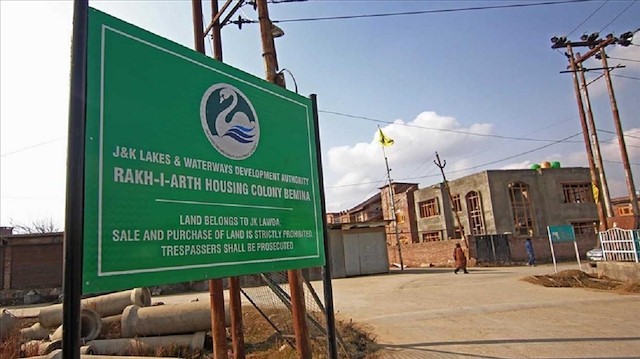
It takes only a drop of slurry to spoil a pail of milk, says Fayaz Ahmad Dar, a resident of Rakh-e-Arth, a sprawling former game reserve on the outskirts of Srinagar, the capital of disputed Jammu and Kashmir.
Dar used the slurry analogy to show his resentment at the Indian government’s plan to build a housing colony for retired soldiers.
“A housing colony for soldiers on even 10 acres of land is a big problem for us. Soldiers will need security and that means a continuous movement of soldiers. If they are attacked, we will have to face the music,” Dar said.
A chunk of land at Rakh-e-Arth is one of several sites where the colony might come up, according to revenue official Nusrat Aziz. She told Anadolu Agency that revenue officials in all 10 districts of Kashmir were asked to identify land for the colony. A welfare board for soldiers will finally pick the site.
A similar proposal had in 2016 triggered protests by pro-freedom groups.
Masood Khan, the president of Pakistani-administered Kashmir, also known as Azad Kashmir, on Dec. 20 “expressed serious concern over Indian government’s move to build the first military settlement in Budgam.”
A video in which a masked gunman threatened attacks on such settlements appeared on social media in Kashmir last week.
India last year scrapped autonomous character of Jammu and Kashmir and opened gates for outsiders to buy land and take government employment there. Pro-freedom groups and even pro-India political parties fear that subsequent changes in land laws are aimed at settling outsiders to reduce the majority Muslims into a minority.
Abdul Samad Malla, an elderly resident of Rakh-e-Arth, told Anadolu Agency that an exclusive housing colony for retired Kashmiri soldiers at Rakh-e-Arth could be a precursor to similar projects for retired soldiers from outside.
“This is an explosive situation. We won’t allow any soldiers’ settlement here. The government has failed to develop this piece of land for decades. Rather than developing this, it is creating problems for us who still crave basic necessities,” he said.
Twenty years down the line, only 630 dwellings housing anywhere between 700 and 900 families have been constructed by the displaced people at Rakh-e-Arth with government’s assistance, Nilofar Jan, an official of the Lakes and Waterways Development Authority, told Anadolu Agency. The authority is the key government department overseeing the relocation of the lake dwellers. She said more than 6,000 families await relocation.
The colony looks like a wasteland dotted with shabby dwellings in various stages of construction, shacks made of iron sheets, unpaved muddy lanes and the main road dotted with potholes. Many lake dwellers are reluctant to move.
Ghulam Muhammad Dar, whose family of six moved to Rakh-e-Arth a few years ago, said he learnt about the proposed soldiers’ colony from an online media outlet.
“For the government thousands of us residents don’t count. Nobody cared to ask us. They will face our resistance but if they come with armored vehicles and tanks what can we do?” he told Anadolu Agency.
Overlooking Rakh-e-Arth residents is a massive camp of the Indian army in the adjacent Sharifabad locality. The residents believe the camp could be the reason why Rakh-e-Arth was marked as one of the sites for the soldiers’ colony.
“What would stop them from connecting Sainik [soldiers] colony to the camp through a road? In that case, Rakh-e-Arth would become another access route to the Sharifabad camp and our colony a thoroughfare for army vehicles,” said Ghulam Muhammad.
- 3 military colonies in Jammu
Noted human rights activist Ahsan Untoo questioned the need for a soldiers housing colony in the “most militarized region in the world.”
“When an army convoy passes by on highways, all traffic comes to a standstill. This is a gross human rights violation. Patients, office goers, students suffer. Now imagine the situation of a soldiers’ colony in the midst of a civilian settlement,” he said.
Untoo cited examples of several places in northern Kashmir, like Kupwara, where India military camps in the proximity of civilian areas have curtailed people’s movement.
Three Sainik colonies already exist in the Jammu province of the Jammu and Kashmir region. Several Indian states also have colonies where subsidized housing is provided for retired soldiers. A plan to build the first one in Kashmir fell through after protests by pro-freedom groups in 2016.
At the time of the protests, Tarun Vijay, a Hindu right-wing member of Indian parliament, who had mooted the idea of setting up such colonies in Kashmir in parliament, had told the media that “a Sainik colony would be like planting saffron in Kashmir.”
Saffron is the sacred color for Hindus and several of the ruling Hindu right-wing’s symbols, like flags, have saffron color. Vijay had said a Sainik colony would bring "fragrance of Indianness and principal mainstream of patriotic India to overcome the smell of stone-pelting and guns.”
When Anadolu Agency contacted Vijay, he said he was in a meeting. Asked if he would like to speak later, he said, “I don’t think so. This is not the right time.” Anadolu Agency’s calls to the Srinagar-based Sainik Welfare Board went unanswered.
*The names of Rakh-e-Arth residents have been changed on their requests as they feared reprisal.














